9 Foods Dangerous To Your Pet. Welcome. We here at Kittystead believe this information is very important to share. Before we begin, we want to confess we feed our furbabies table food almost every time we eat. Why do you ask? Well, the simple answer is they are cute and love to eat what we eat. But that doesn’t mean they get everything we eat because there is food that can make our furbabies ill or worse, kill them.
So today we want to go over various foods and/or items that furbabies should never eat. We are not going to cover basics like chocolate because, for the most part, it is common knowledge that chocolate is dangerous for dogs and cats. Please note the below list is for both canines and felines together.
Before we begin we suggest putting the ASPCA Animal Poison Control Center Phone Number: (888) 426-4435 in your phone and on your fridge because accidents happen with furbabies as with toddlers and having a person to call immediately will help you and them. Remember your FURfamily members are forever toddlers that will get into everything if the opportunity presents itself.
This list is not the only items that will affect your furbaby. Please pay attention to their well-being anytime eating anything new or swallowing pills and call for an immediate assistant if they show signs of poison or issues.
Symptoms can include vomiting, diarrhea, agitation, breathing difficulties or loss of consciousness, and heart issues.
1. Xylitol

This is an artificial sweetener that is used in a lot of sugar-free items such as energy drinks, candies, doughnuts, and some foods. We do a lot of sugar-free food in our household, so we have to be sure we keep it out of our cats’ reach. Now not all sugar-free items have this sweetener, but it is best just to not risk it for your furbabies.
2. Cherry Pits

Cherry season is over for now but it will be back soon, and with that cherry pits are on the list. Besides a choking hazard for your furbaby, they are extremely poisonous.
3. Grapes and Raisins

Now we could have broken this up for two items on this list but since they are clearly from the same group there is no reason for the separation. It was only a few years ago we found out that grapes and raisins are poisonous to our furbabies. We have noticed over the years, if our furbabies ate one or two grapes, they did not just fall over dead but they did get diarrhea. Of course, we have no idea, if it affected their liver or other inside parts. Our Maggie Mae would play with a grape then eat it after awhile – it was cute watching her. As soon as we learned about grapes being bad we stopped giving her any grapes.
4. Onions

Next up we have onions. Onions are part of the Allium family—onions, garlic, leeks, and chives. Onions contain N-propyl disulfide, which consumption of as little as 15 to 30 grams for pets can result in clinical issues. Also, it is not always right away to see the signs of illness it can take a few days for everything to set in. Symptoms may include Lethargy, Weakness, Ataxia (lack of coordination), Pale gums, Vomiting and/or diarrhea, Increased heart and/or respiratory rate, Red or brown discolored urine, Hyper-salivation.
5. Hops

This item is a little rarer in some homes, but as home brewing increases in popularity, more dogs may be at risk for exposure. Hops plugs tend to be more toxic than hops pellets. The exact toxic principle is unknown but may be related to essential oils, resins, phenolic compounds, or nitrogenous constituents within the plant. When ingested by dogs (or rarely, cats), signs of hop poisoning include malignant hyperthermia, increased breathing, a racing heart rate, anxiety, vomiting, abnormal clotting, and even death. So if you are planning on doing home brewing yourself be sure it is out of reach of pets.
6. Black Walnut

These nuts are native to the Northeastern United States and Canada, and are toxic for both dogs and horses but, interestingly enough not for cats. Walnuts have high moisture content and can start growing fungi whether they are shelled or not. Some fungi that can grow on walnuts produce metabolites called mycotoxins, which are considered to be carcinogenic, which others produce tremorgenic mycotoxins, which can cause tremors and seizures.
7. Alcohol

Now most of us know not to give our furbabies alcohol, but according to the ASPCA, this is more common than we think. So if you plan on having any holiday party’s just be sure to keep the adult beverages away from the little humans and furbabies alike. Signs of alcohol poison in your pets are Loss of consciousness, Kidney failure, Liver failure, Metabolic acidosis (too much acid), Respiratory problems, Cardiac arrest, and even Death.
8. Yeast

This one is for all of us bakers and chefs out there. There is something quite satisfying about cooking; but if you are cooking something with yeast and must let it rise be sure to keep out of reach of your dogs or cats. Yeast contained in even a small amount of raw bread or pizza dough can quickly produce enough alcohol and carbon dioxide to cause serious problems for your furbabies. Raw dough or any kind of yeast dough, not just bread can expand, just like it does on the counter, but inside your pet, it can lead to a distended stomach and severe bloating. In rare instances, surgery is required to remove the dough mass. Yeast also produces ethanol as a by-product and a pet eating raw bread dough can become drunk, which, as mentioned in number seven, alcohol can cause severe problems and even death.
9. Coffee, Tea, Caffeine


Caffeine has become a very common element in our lives. Many common products contain caffeine including coffee, tea, soda, energy drinks, and some supplements like pre-workout and weight-loss supplements. Both caffeine and theobromine, a chemical related to caffeine, is also found in chocolate. Dogs and cats appear to be more sensitive to the effects of caffeine than people. One or two licks of coffee, tea, or soda are unlikely to cause poisoning in most pets.
However, ingestion of unused coffee grounds or beans, tea bags, or supplements could cause serious toxicity in dogs or cats. Depending on the amount ingested, signs of hyperactivity, restlessness, vomiting, elevated heart rate, high blood pressure, abnormal heart rhythms, tremors, and elevated body temperature may be seen. In severe cases, seizures, collapse, and death are possible.
Thank you for joining us for today’s post. We listed only 9 things that are dangerous for your pets. Please call the poison hotline for animals and/or seek out medical attention if you have any questions about what your furbaby ate or the way he/she is acting. There are a lot more foods, medicines, and household plants that can be toxic to your furbaby and we advise you to follow your FURparent instinct if you feel something is not right with your baby.
As always, we have enjoyed our time with you. Please comment with any questions or suggestions for future articles and be sure to sign up for the Kittystead newsletter, for upcoming blogs, tips, and insider information.





